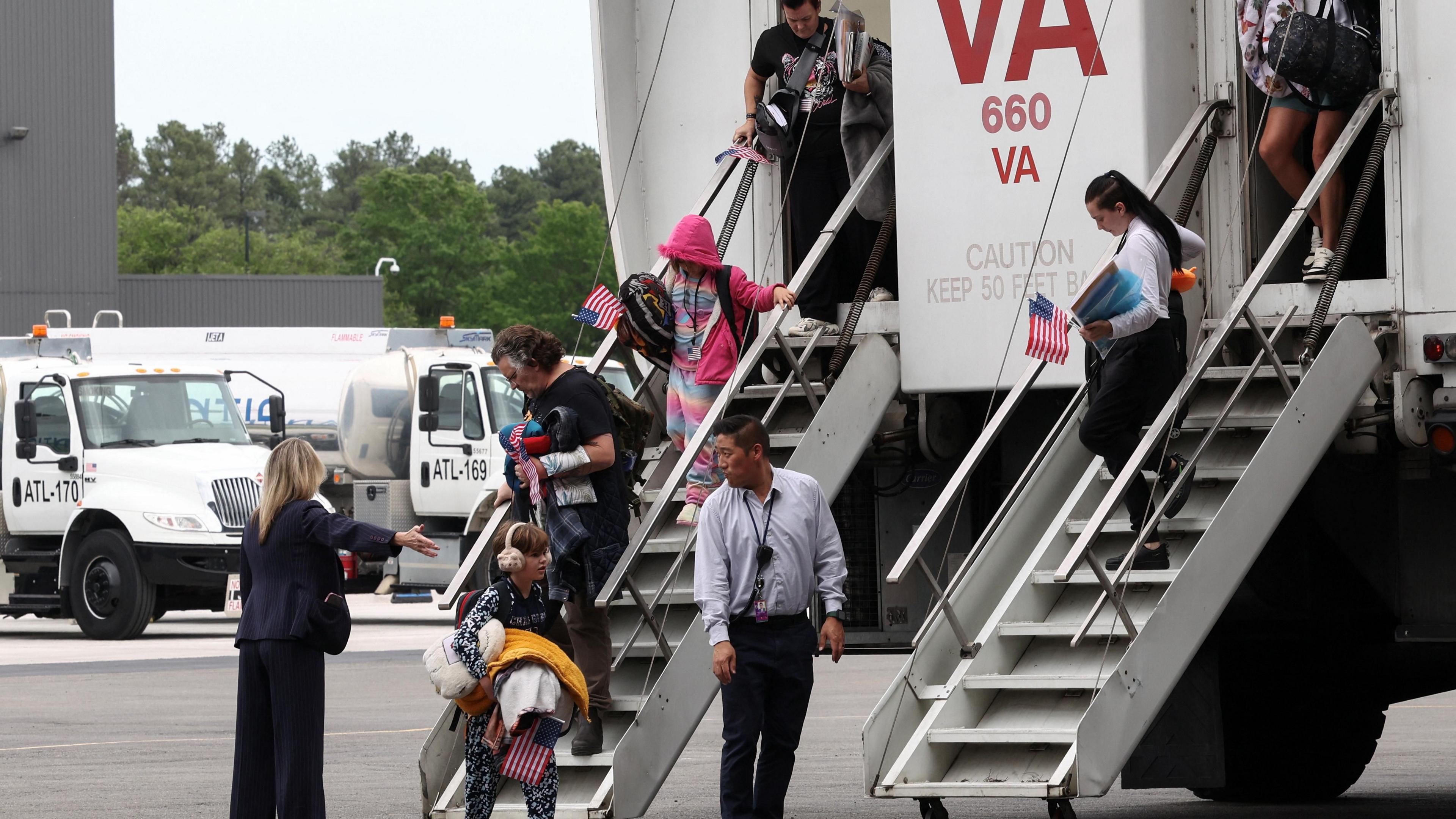Dozens of white South Africans arrive in US under Trump refugee plan
Watch: Why US is granting white South Africans refugee status
- Published
A group of 59 white South Africans has arrived in the US, where they are to be granted refugee status.
President Donald Trump has said the refugee applications for the country's Afrikaner minority had been expedited as they were victims of "racial discrimination".
The South African government said the group were not suffering any such persecution that would merit refugee status.
The Trump administration has halted all other refugee admissions, including for applicants from warzones. Human Rights Watch described the move as a cruel racial twist, saying that thousands of people - many black and Afghan refugees - had been denied refuge in the US.
The group of white South Africans, who landed at Dulles airport near Washington DC on Monday, received a warm welcome from US authorities.
Some held young children and waved small American flags in the arrival area adorned with red, white and blue balloons on the walls.
The processing of refugees in the US often takes months, even years, but this group has been fast tracked. UNHCR - the United Nations refugee agency - confirmed to the BBC it wasn't involved in the vetting, as is usually the case.
Asked directly on Monday why the Afrikaners' refugee applications had been processed faster than other groups, Trump said a "genocide" was taking place and that "white farmers" specifically were being targeted.
"Farmers are being killed, they happen to be white, but whether they're white or black makes no difference to me."
But South African President Cyril Ramaphosa said he told Trump during a phone call the US assessment of the situation was "not true".
"A refugee is someone who has to leave their country out of fear of political persecution, religious persecution, or economic persecution," Ramaphosa said. "And they don't fit that bill."
In response to a question from the BBC at Dulles airport, Deputy Secretary of State Christopher Landau said: "It is not surprising, unfortunately, that a country from which refugees come does not concede that they are refugees."
The US has criticised domestic South African policy, accusing the government of seizing land from white farmers without any compensation.
In January President Ramaphosa signed a controversial law allowing the government to seize privately owned land without compensation in certain circumstances, when it is deemed "equitable and in the public interest".
But the government says no land has yet been seized under the act.
There has been frustration in South Africa over the slow pace of land reform in the three decades since the end of the racist apartheid system.
While black South Africans make up more than 90% of the population, they only hold 4% of all privately owned land, according to a 2017 report.
One of Trump's closest advisers, South African-born Elon Musk, has previously said there was a "genocide of white people" in South Africa and accused the government of passing "racist ownership laws".
The claims of a genocide of white people have been widely discredited.
Skin colour of South African farmers "makes no difference" to Trump
In a statement to the BBC, Gregory Meeks, ranking Democratic member of the House Foreign Affairs Committee, said the Trump administration's refugee resettlement was "not just a racist dog whistle, it's a politically motivated rewrite of history".
The Episcopal Church said it would no longer work with the federal government on refugee settlement because of the "preferential treatment" granted for the Afrikaners.
Commenting on this news on X, Vice-President JD Vance posted, "Crazy".
Melissa Keaney, a lawyer with the International Refugee Assistance project, told the BBC the White House's decision to fast-track the Afrikaners' arrival amounted to "a lot of hypocrisy and unequal treatment".
Her organisation is suing the Trump administration after it indefinitely suspended the US Refugee Admissions Program (USRAP) in January. She said that policy had left over 120,000 conditionally approved refugees in limbo.
Afrikaner author Max du Preez told the BBC's Newsday radio programme that claims of persecution of white South Africans were a "total absurdity" and "based on nothing".
Figures from the South African police show that in 2024, 44 murders were recorded on farms and smaller plots of agricultural land, with eight of those killed being farmers.
South Africa does not report on crime statistics broken down by race but a majority of the country's farmers are white, while other people living on farms, such as workers, are mostly black.
Bilateral relations between the US and South Africa have been strained since President Trump first tasked his administration with resettling Afrikaners, a group with mostly Dutch ancestry, in the US.
In March, South Africa's ambassador to the US, Ebrahim Rasool, was expelled after accusing President Trump of using "white victimhood as a dog whistle", leading to the US accusing Mr Rasool of "race-baiting".
The US has also criticised South Africa for taking an "aggressive" position against Israel at the International Court of Justice (ICJ), where Pretoria has accused Prime Minister Benjamin Netanyahu's government of genocide against Palestinians - a claim the Israelis strongly reject.
President Trump's openness to accepting Afrikaner refugees comes as the US has engaged in a wider crackdown on migrants and asylum seekers from other countries.
Additional reporting by Khanyisile Ngcobo in Johannesburg & Cai Pigliucci in Washington DC

The first group of white South Africans land at Dulles Airport
More BBC stories about South Africa:

Go to BBCAfrica.com, external for more news from the African continent.
Follow us on Twitter @BBCAfrica, external, on Facebook at BBC Africa, external or on Instagram at bbcafrica, external